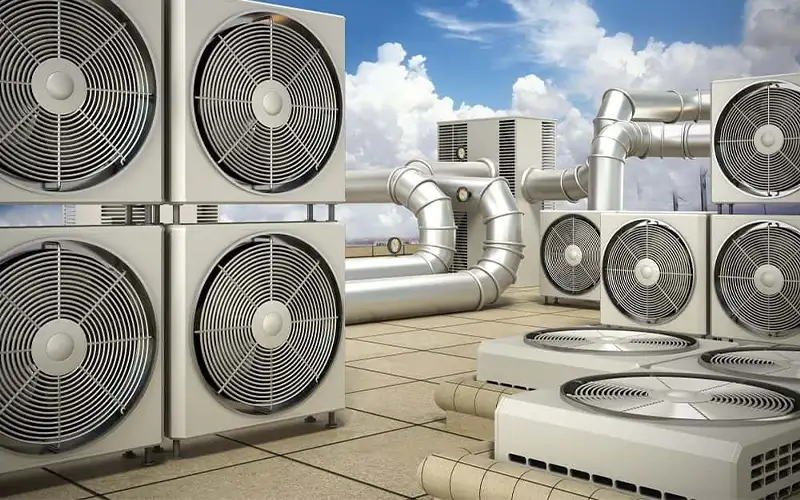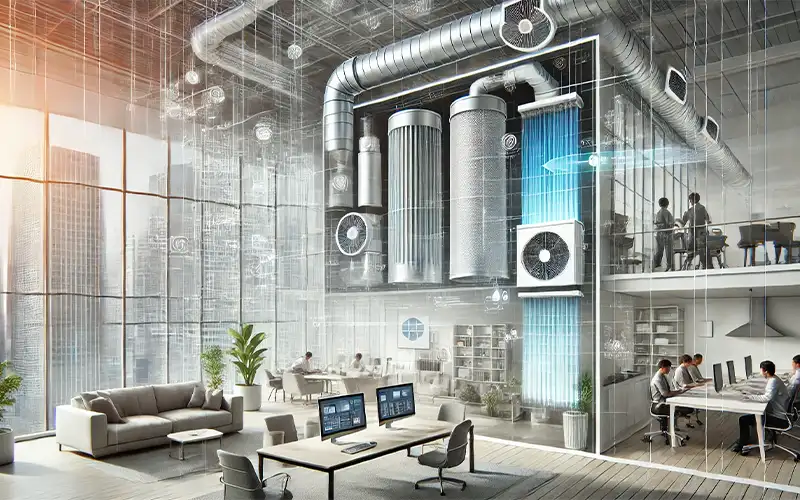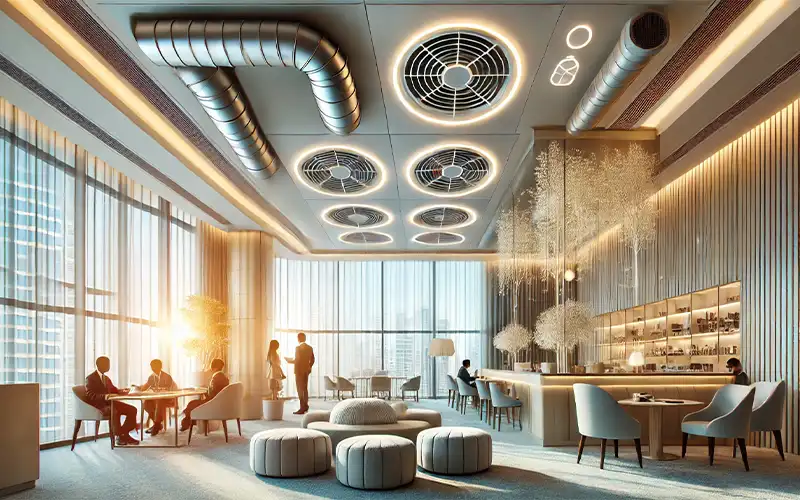The Role of HVAC Systems in Indoor Air Quality
Table of Contents:
Section 1: How HVAC Systems Affect Indoor Air Quality
Section 2: Components of HVAC Systems That Impact IAQ
Section 3: Common IAQ Problems and How HVAC Systems Address Them
Section 4: Best Practices for Improving IAQ with HVAC Systems
Indoor air quality (IAQ) plays a crucial role in the health and comfort of building occupants. Poor IAQ can lead to a range of health issues, including respiratory problems, allergies, and even chronic diseases.
HVAC (Heating, Ventilation, and Air Conditioning) systems are integral in maintaining good IAQ by controlling temperature, humidity, and the level of contaminants in the air.

How HVAC Systems Affect Indoor Air Quality
Ventilation: Bringing in Fresh Air and Removing Stale Air
Ventilation is a crucial aspect of HVAC systems, responsible for maintaining a continuous flow of fresh air while removing stale air from indoor spaces.
Proper ventilation helps dilute and remove indoor pollutants, such as carbon dioxide, volatile organic compounds (VOCs), and other airborne contaminants.
By introducing fresh outdoor air, HVAC systems help maintain adequate oxygen levels and reduce the concentration of indoor pollutants, ensuring a healthier and more comfortable environment for occupants.
Effective ventilation is essential in preventing the buildup of harmful substances and ensuring indoor air remains fresh and clean.
Filtration: Removing Contaminants from the Air
Filtration is another key function of HVAC systems that directly impacts indoor air quality.
Air filters within the HVAC system capture a wide range of airborne particles, including dust, pollen, mold spores, bacteria, and viruses.
The efficiency of these filters is measured by their MERV (Minimum Efficiency Reporting Value) rating, which indicates their ability to trap particles of various sizes.
High-efficiency filters, such as HEPA filters, can remove up to 99.97% of particles as small as 0.3 microns.
By effectively filtering out contaminants, HVAC systems help reduce the presence of allergens and pathogens, contributing to a healthier indoor environment.
Humidity Control: Maintaining Optimal Humidity Levels
Maintaining optimal humidity levels is crucial for both comfort and health, and HVAC systems play a vital role in this process.
Proper humidity control prevents the air from becoming too dry or too moist, which can lead to various health issues and discomfort. Low humidity levels can cause dry skin, irritation of the respiratory tract, and static electricity, while high humidity levels can promote the growth of mold, mildew, and dust mites.
HVAC systems can be equipped with humidifiers and dehumidifiers to regulate indoor humidity levels, ensuring they remain within the optimal range of 30-50%.
This balance helps create a comfortable and healthy indoor environment, reducing the risk of respiratory issues and other health problems associated with improper humidity levels.

Components of HVAC Systems That Impact IAQ
Air Filters
Air filters are crucial in capturing airborne particles such as dust, pollen, and mold spores, preventing them from circulating through the HVAC system and into indoor spaces.
The efficiency of air filters is measured by the MERV rating, with higher ratings indicating better filtration capabilities.
Regular maintenance and timely replacement of air filters ensure optimal performance and help maintain good indoor air quality.
Ductwork
Ductwork distributes conditioned air throughout a building, and well-maintained, properly sealed ducts are essential for clean air delivery.
Regular inspection and cleaning of ductwork prevent the accumulation and spread of dust, mold, and other pollutants.
Humidifiers and Dehumidifiers
Humidity control is vital for indoor air quality, and HVAC systems often include humidifiers and dehumidifiers to regulate moisture levels.
Maintaining optimal humidity (30-50%) prevents respiratory issues and the growth of mold and dust mites.
UV Germicidal Lights
UV germicidal lights, installed within HVAC systems, emit ultraviolet radiation to kill or deactivate microorganisms like bacteria, viruses, and mold spores.
Common IAQ Problems and How HVAC Systems Address Them
Dust and Allergens
Dust and allergens, such as pollen, pet dander, and dust mites, are common indoor air contaminants that can trigger allergies and respiratory issues.
HVAC systems address these problems through effective filtration, using high-efficiency air filters like HEPA filters to capture and remove these particles from the air.
Mold and Mildew
Mold and mildew thrive in environments with excess moisture, leading to health issues such as allergic reactions and respiratory problems.
HVAC systems help control mold and mildew growth by maintaining optimal humidity levels and using dehumidifiers to remove excess moisture from the air.
Volatile Organic Compounds (VOCs)
VOCs are emitted from various household products, such as paints and cleaning supplies, and can cause headaches, dizziness, and long-term health effects.
HVAC systems help mitigate the presence of VOCs through proper ventilation, introducing fresh outdoor air and using activated carbon filters to absorb VOCs.

Best Practices for Improving IAQ with HVAC Systems
Regular Maintenance and Filter Replacement
Regular maintenance and timely filter replacement are essential for ensuring optimal performance of HVAC systems and maintaining good indoor air quality.
Scheduled maintenance should include inspecting and cleaning components such as ducts, coils, and fans to prevent the buildup of dust and contaminants.
Replacing air filters according to the manufacturer’s recommendations is crucial, as clogged or dirty filters can impede airflow and reduce filtration efficiency, allowing pollutants to circulate in indoor spaces.
Using High-Efficiency Filters
Upgrading to high-efficiency filters, such as those with a MERV (Minimum Efficiency Reporting Value) rating of 13 or higher, can significantly improve indoor air quality.
These filters are designed to capture smaller particles, including dust, pollen, mold spores, and even some bacteria and viruses.
High-efficiency filters are particularly beneficial in environments where maintaining a high standard of air quality is essential, such as in homes with allergy sufferers or in commercial buildings with high foot traffic.
Proper Ventilation Practices
Proper ventilation is key to maintaining good indoor air quality, as it ensures the continuous exchange of indoor and outdoor air.
HVAC systems should be designed to provide adequate ventilation rates based on the size and occupancy of the building.
Utilizing mechanical ventilation systems, such as exhaust fans and air exchange units, helps remove stale air and bring in fresh air, diluting indoor pollutants.
Additionally, ensuring that ventilation systems are balanced and operating efficiently prevents the buildup of harmful gases and contaminants.
Conclusion
HVAC systems are vital in maintaining indoor air quality by providing effective ventilation, filtration, and humidity control.
Ensuring regular maintenance, using high-efficiency filters, and integrating advanced air purification technologies can significantly enhance IAQ.
Contact CleanLink’s air filter professionals for filtration solutions for your HVAC systems.

